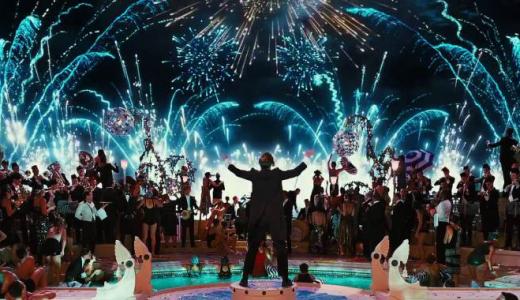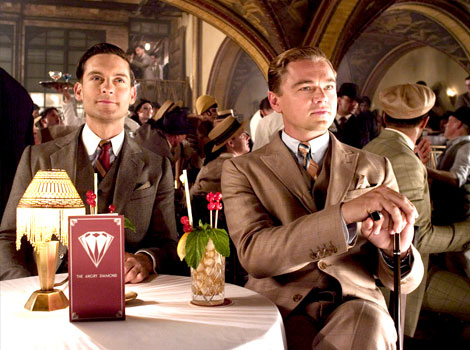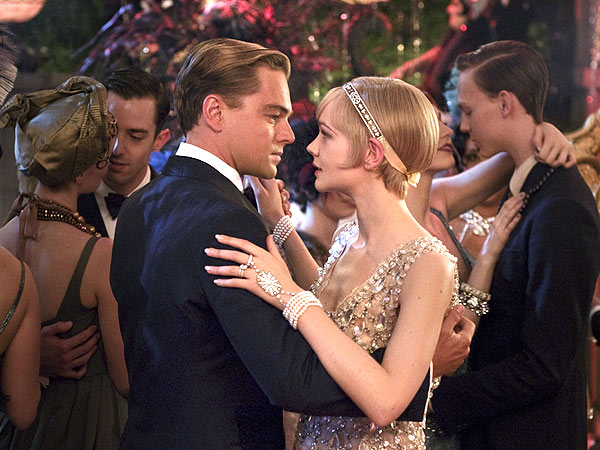The Great Gatsby (2013)
CAST: Leonardo DiCaprio, Tobey Maguire, Carey Mulligan, Joel Edgerton, Elizabeth Debicki, Isla Fisher, Jason Clarke, Amitabh Bachchan, Jack Thompson
REVIEW:
I’ll get this out of the way right upfront: I have never read F. Scott Fitzgerald’s 1925 novel, now considered a staple of American literature (though it was received poorly at the time, perhaps partly due to its social commentary on 1920s excess), so this review will not include comparisons to the book or any previous film adaptation (the most prominent of which came out in 1974 and starred Robert Redford in the title role), merely review this as a stand-alone film. Director Baz Luhrmann (who previously directed Leonardo DiCaprio in Romeo & Juliet, and also helmed Moulin Rouge and Australia) never crafts films conventionally, instead turning them into over-the-top, garish visual orgies that pack a kinetic kick but are sometimes flimsier in the narrative department. The Great Gatsby fits what we expect from Luhrmann. Fans of Moulin Rouge’s orgiastic visual extravaganza will be drawn to Gatsby, while some others will no doubt be unimpressed with the unconventional way Luhrmann has brought Fitzgerald’s work to the screen.
Like Moulin Rouge, the story is told after the fact, as writer Nick Carraway (Tobey Maguire), who ended up in a sanitarium due to his heartbreak over the events of the story, tries to find solace first by confiding the sad tale to a kindly psychiatrist (Jack Thompson), then writing it out as a novel which he titles, of course, “Gatsby”. Through Nick’s words (often superimposed across the screen as he writes them), the glamorous but ultimately tragic tale unfolds. At the height of the roaring 1920s, with the pre-Depression New York City reaching a pinnacle of excess and decadence, Nick, a failed writer, arrives to sell bonds on Wall Street. Meanwhile, he takes up residence in a small rented cottage on Long Island sandwiched between opulent mansions, across the river from his cousin Daisy (Carey Mulligan) and her white supremacist, skirt-chasing, old money husband Tom Buchanan (Joel Edgerton). He eventually meets Daisy’s friend, socialite Jordan Baker (Elizabeth Debicki), and finally his seldom-seen next door neighbor, the fabulously wealthy but elusive Jay Gatsby (Leonardo DiCaprio), a man of mystery who tells fantastic tales about himself and invites Nick to one of his notoriously wild parties one night. But Gatsby has ulterior motives in befriending Nick involving a long-ago romance with Daisy which Gatsby is obsessed with rekindling. Against his better judgment, Nick becomes entangled in helping orchestrate his married cousin’s reunion with her old flame, but Gatsby has other unsavory secrets, and as Nick is drawn further into his world, tension builds as Tom becomes suspicious of Gatsby and an accident sparks a chain of events that will lead to tragedy.
 As in Moulin Rouge, the biggest “star” of The Great Gatsby is the behind-the-scenes presence of Baz Luhrmann and his throw-the-kitchen-sink visual style. One going into Gatsby without knowing it’s by the same director as Moulin Rouge could easily surmise it by the film’s look. Like Moulin Rouge, the world here is not strictly rooted in reality and both will annoy sticklers for historical accuracy. As in Moulin Rouge, modern music frequently plays, and many of the backgrounds are CGI (also similar to Sin City). This kind of thing works better in Moulin Rouge, which was a musical fantasy where reality doesn’t matter as much, than in an adaptation of a revered period novel, and there are moments when modern songs blaring out of 1920s cars is jarring and distracting. Luhrmann does an effective job in wardrobes and various other period details of replicating the 1920s, but also delights in being cheekily anachronistic, somewhat at cross purposes. The novel’s thrust of examining the decadence of the 1920s just before the crash of the Great Depression is a little lost, and while lip service is paid to Fitzgerald’s condemnation of superficial glamor, the message gets a little muddled, considering Luhrmann himself delights in reveling in it. There are various times when Luhrmann’s visual spectacle is compelling and packs a kinetic kick and moments of beauty, but others where it gets overwhelming.
As in Moulin Rouge, the biggest “star” of The Great Gatsby is the behind-the-scenes presence of Baz Luhrmann and his throw-the-kitchen-sink visual style. One going into Gatsby without knowing it’s by the same director as Moulin Rouge could easily surmise it by the film’s look. Like Moulin Rouge, the world here is not strictly rooted in reality and both will annoy sticklers for historical accuracy. As in Moulin Rouge, modern music frequently plays, and many of the backgrounds are CGI (also similar to Sin City). This kind of thing works better in Moulin Rouge, which was a musical fantasy where reality doesn’t matter as much, than in an adaptation of a revered period novel, and there are moments when modern songs blaring out of 1920s cars is jarring and distracting. Luhrmann does an effective job in wardrobes and various other period details of replicating the 1920s, but also delights in being cheekily anachronistic, somewhat at cross purposes. The novel’s thrust of examining the decadence of the 1920s just before the crash of the Great Depression is a little lost, and while lip service is paid to Fitzgerald’s condemnation of superficial glamor, the message gets a little muddled, considering Luhrmann himself delights in reveling in it. There are various times when Luhrmann’s visual spectacle is compelling and packs a kinetic kick and moments of beauty, but others where it gets overwhelming.
 Also problematically, the visual style threatens to overshadow the actors, making it hard to care about the characters. Tobey Maguire, who’s appeared in high-profile films only sporadically since finishing Sam Raimi’s Spider-Man trilogy, is okay as Nick, though his dorky boy-next-door demeanor doesn’t quite convince us all these glamorous people would be interested in spending so much time with him. The real “star”, unsurprisingly, is Leonardo DiCaprio (Maguire’s lifelong close friend), whose handsome looks and suave charisma serve him well as the slick Gatsby. More notably, DiCaprio also conveys the lonely, haunted, troubled soul of a man who has devoted his entire life to pursuing wealth and glamor only to find his own existence empty and hollow. Gatsby is no saint, and his love for Daisy borders on irrational obsession, but DiCaprio makes us feel some sympathy toward him, which is important. Carey Mulligan is somewhat less successful. Like DiCaprio, she looks the part of a glamorous 1920s socialite, but unlike DiCaprio, her performance comes across as affected and artificial and like there’s nothing going on beneath the facade. Then again, considering Daisy is meant to be superficial, maybe that’s intentional. Joel Edgerton plays her sleazy husband with a physical mustache and figurative twirling of it. Jason Clarke has the small but key role of Wilson, the husband of Buchanan’s mistress Myrtle (Isla Fisher). Australia alum Jack Thompson has the small role of Nick’s psychiatrist, and Indian actor Amitabh Bachchan is Meyer Wolfsheim, a gangster with whom Gatsby has mysterious business dealings.
Also problematically, the visual style threatens to overshadow the actors, making it hard to care about the characters. Tobey Maguire, who’s appeared in high-profile films only sporadically since finishing Sam Raimi’s Spider-Man trilogy, is okay as Nick, though his dorky boy-next-door demeanor doesn’t quite convince us all these glamorous people would be interested in spending so much time with him. The real “star”, unsurprisingly, is Leonardo DiCaprio (Maguire’s lifelong close friend), whose handsome looks and suave charisma serve him well as the slick Gatsby. More notably, DiCaprio also conveys the lonely, haunted, troubled soul of a man who has devoted his entire life to pursuing wealth and glamor only to find his own existence empty and hollow. Gatsby is no saint, and his love for Daisy borders on irrational obsession, but DiCaprio makes us feel some sympathy toward him, which is important. Carey Mulligan is somewhat less successful. Like DiCaprio, she looks the part of a glamorous 1920s socialite, but unlike DiCaprio, her performance comes across as affected and artificial and like there’s nothing going on beneath the facade. Then again, considering Daisy is meant to be superficial, maybe that’s intentional. Joel Edgerton plays her sleazy husband with a physical mustache and figurative twirling of it. Jason Clarke has the small but key role of Wilson, the husband of Buchanan’s mistress Myrtle (Isla Fisher). Australia alum Jack Thompson has the small role of Nick’s psychiatrist, and Indian actor Amitabh Bachchan is Meyer Wolfsheim, a gangster with whom Gatsby has mysterious business dealings.
Under all the visual excess, there are other things to appreciate about The Great Gatsby besides the spectacle. The novel’s themes of celebrity, glamor, superficiality, power, and love are intact. The gist of Gatsby’s character—that his fabulously wealthy, dazzlingly glamorous existence is lonely and hollow—is conveyed effectively. The saying “money can’t buy happiness” could sum up the theme in a nutshell. There’s an exuberance to Luhrmann’s filmmaking style even in its excess that can sweep you along even as it distracts and frustrates. The pace is uneven and meandering, lurching sluggishly through its midsection, although the tension and emotion builds as we near the climax, and the conclusion has poignancy. Some fans of the novel will doubtlessly be appalled at what Luhrmann has done to their beloved book. Others, especially those who eat up the over-the-top spectacle of Moulin Rouge, will find things to enjoy. For those in between, like myself, The Great Gatsby is entertaining and engaging but ultimately almost as hollow as its title character.
* * 1/2
